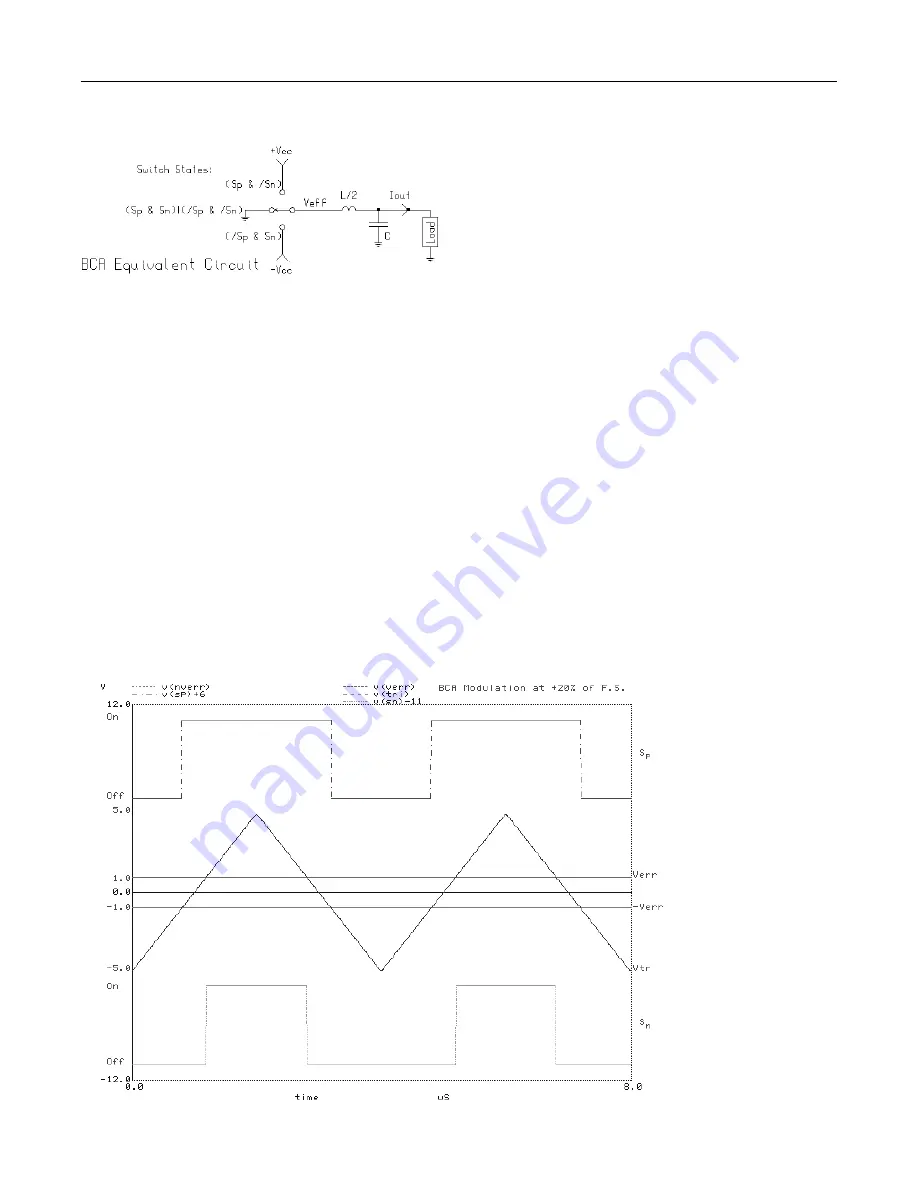
]
Balanced Current Amplifier
When the amplifier is at quiescent state with no output
voltage, the equivalent switch will always be at the ground
position as the switches are operating in unison, either
being on or off with a 50% duty cycle. In other words
Tp=Tn=Ts/2 where Ts is the inverse of the switching fre-
quency, the switching period. If Tp is the period that Sp
is on and Tn is the period that Sn is on, then Tp+Tn=Ts.
When the output is programmed to be positive, the Sp
switch will enable before the Sn and disable after the Sn
switch. The width of Sp (Tp) increases as the width of
Sn (Tn) decreases. The total duty cycle of both switches
is still set to 100% (Tp+Tn=Ts). When the Sp switch is
on and the Sn is not, the equivalent output switch is set
to +Vcc. Not until negative output is programmed will
there be a case of having the Sn switch on and not the
Sp switch. Therefore when producing a positive output,
the effective input voltage to the output inductor (L/2) is
a unipolar pulse sequence at twice the basic switch op-
erating frequency.
When a negative output is to be produced, there will not
be a time when the Sp switch is on and not the Sn, thus
the output will be a unipolar negative double frequency
pulse sequence.
The suggested equivalent circuit reveals the low output
ripple nature of the Crown BCA. A full null in the output
ripple current occurs at zero output, the very state which
is most commonly occupied by audio (and many other)
signals. The effective output frequency is doubled with-
out operating any switch at double frequency. Bridged
output circuits are commonly understood to double the
ripple frequency but note that they use four switches to
obtain a doubling of frequency. When the BCA’s output
stages are used in a full-bridge, the output ripple fre-
quency can be quadrupled. The trick is to operate the
second half of the full bridge with phase quadrature
modulation. The Crown BCA amplifier operates the two
channels in phase quadrature which allows the balanced
monaural output to have a 1MHz ripple frequency, yet
no switch is operating at other than 250KHz. Since any
given effective output pulse has two modulation deci-
sions (one on each edge), the effective control sampling
rate is 1Ms/S (Mega-samples per Second) for each chan-
nel; but when operated in balanced monaural mode, that
effective rate rises to 2Ms/S.
The methods used to
design the modulation
of the Crown BCA are
those of interleaved
power converter de-
sign. Interleaved power
conversion is one of a
number of cutting-edge
technologies being ex-
plored in the larger
venue of power elec-
tronics. A classification
system exists in power
electronics capable of
describing most cir-
cuits. The Crown BCA’s
power stage is properly
classified as a fully in-
terleaved buck-derived
power converter.
Crown has chosen to
give the generic names
of OCA and OCIA (Oh-
see-yuh) to these new
5
Positive-Programmed Output

























